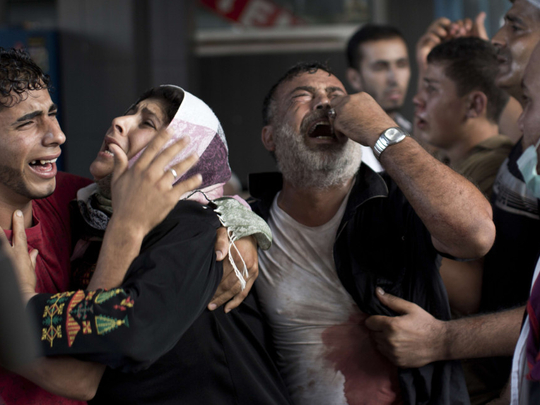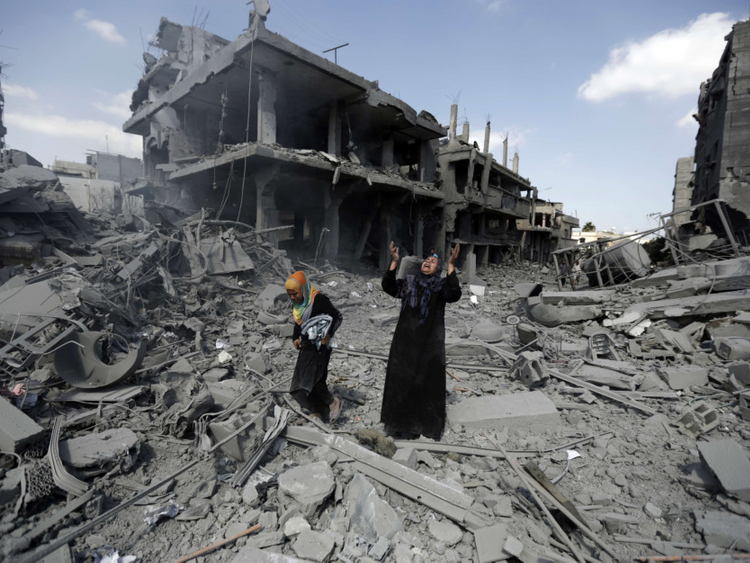
Dubai: The Israeli war on the impoverished Gaza Strip last July not only inflicted extensive casualties among Palestinian civilians and huge losses on their economy, it also caused deep emotional scars and psychological traumas, an aid official said.
The war, which lasted 50 days, has forced a shift in aid organisations’ priorities in the enclave, which is considered one of the most populous spots in the world, explained Bill Corcoran, President and CEO of Anera, an American aid organisation that started its work in the Palestinians territories shortly after 1967 Arab-Israeli war.
“It [priorities] has shifted, unfortunately. Because we were doing more jobs creations for advancing the economy,” Corcoran told Gulf News in an interview during his recent visit to Dubai as part of a Gulf tour to seek support for the aid organisation. “And now, we have gone totally backwards, we are trying to keep them fed, keep clothes on them, and prevent disease by repairing water systems. It is really quite basic right now,” he added.
Corcoran believes Anera reaches out to half of the 1.8 million Gaza population.
During last year’ Israeli war on Gaza, water pipes were extensively destroyed and most of the funds channelled by aid agencies is being spent on just bringing water to Gazans.
“Eventually, we are preparing the water system now,” in partnership with Usaid, Islamic Relief organisation and Kuwaiti government, Corcoran said.
Commenting on the obstacles facing the aid push, Corcoran said: “right now the biggest problem is to get attention for Palestinian families and communities, and reminding people that the situation there is not solved… things have not been solved and they have actually gone backwards,” he added.
Unemployment in Gaza is over 50 per cent, cases of malnutrition among children and stunted growth stand at over 10 per cent; anaemia among children in Gaza is over 30 per cent. Moreover, “children in Gaza, when they try to go to school, the only way to go to school is by being in triple sessions in schools. They are able to go to schools for four or may be five hours. That is it. They leave and then another group of children can come for another four or five hours. The system is broken,” Corcoran added.
“It is abysmal to see what these children are living through. And when you think that the average child now, if the child is 8 years old, or 5 or 6 years old, they have seen three wars. They are damaged.”
After the latest Israeli war, Anera’s staff who are professionals and include engineers, educators and pharmacists, got a psychological counselling to continue work, “so how to expect a small child to adjust to what they have just seen?,” Corcoran said.
According to UN figures, 2,139 Palestinians were killed in the war, including 490 children besides 11,000 who were injured. Up to half a million Gaza residents were displaced, and nearly 20,000 homes were destroyed.
Losses on the Israeli side were put at 64 soldiers and six civilians, including one child.
Apart from Gaza, Anera today has four more offices in the West Bank. The five offices are run by 85 staffers, only one of them is American. The rest are all Palestinians, Corcoran said.
The American NGO works in both Palestine and Lebanon, but “not exclusively” for the Palestinians. Currently, Anera is assisting Syrian refugees in Lebanon as well as Lebanese in villages and in-house communities, he added.
Anera talks to American corporations to bring medicines into Gaza, the West Bank and Lebanon. It has also an arrangement with Toms Shoes to provide footwear for children. Recently, around 80,000 shoes were shipped to children in Gaza. Also, Johnson and Johnson sends aid with the aim of preventing parasitic infections in children.
Anera also has the support of many giant corporations inside and outside the US, as well as individuals donors. Among the regional backers of Anera is Dubai Cares.
Asked whether funding poses a problem, Corcoran replied: We are competing against so many other crises in the region, when you look at Libya, Egypt, Lebanon, Syria — there are just so many of them now, and so in the long run it is a problem, we don’t know how we are going to supply the needs of the Palestinians in the long term.”














